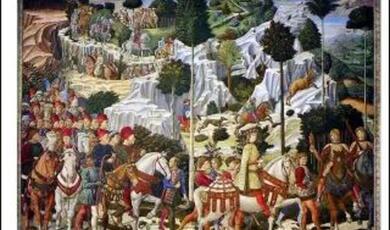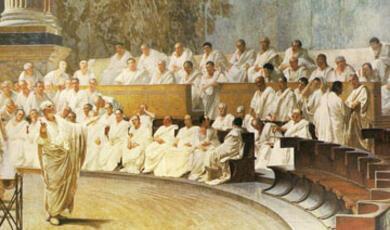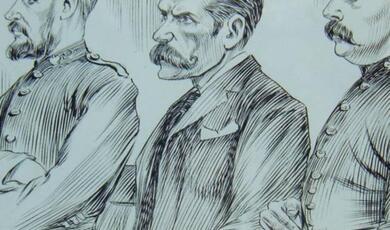Historical Fiction from Sir Walter Scott to Georgette Heyer and Hilary Mantel
Share
- Details
- Text
- Audio
- Downloads
- Extra Reading
Until the 1970s, historical fiction was a scorned genre that belonged to Georgette Heyer and Jean Plaidy. Over recent decades, literary fiction has turned back to History, from Hilary Mantel’s Thomas Cromwell trilogy to Helen Dunmore, Francis Spufford and Eleanor Catton. In the nineteenth century the historical novel had been more respected, with examples (sometimes impressive, sometimes absurd) from Scott, Dickens, and George Eliot.
This lecture will examine the genre’s vicissitudes (while noticing Georgette Heyer’s novelistic virtues).
Download Text
Historical Fiction: Sir Walter Scott to Georgette Heyer and Hilary Mantel
Professor John Mullan
1st March 2023
Perhaps you will recognize this passage. Perhaps you will recognize it even if you have not read the novel from which it is taken.
I
Wreckage (I)
London, May 1536
Once the queen’s head is severed, he walks away. A sharp pang of appetite reminds him that it is time for a second breakfast, or perhaps an early dinner. The morning’s circumstances are new and there are no rules to guide us. The witnesses, who have knelt for the passing of the soul, stand up and put on their hats. Under the hats, their faces are stunned.
It is the opening of Hilary Mantel’s, The Mirror and the Light, published, after much anticipation, in March 2020. It apparently sold well over 100,000 copies in its first week.
We are at the execution of Queen Anne, formerly Anne Boleyn, second wife of Henry VIII. We are a few minutes on from the end of the previous volume, Bring Up the Bodies, which concluded with the Queen’s beheading. We are in the consciousness of Thomas Cromwell. We witness events with his sharp eyes and and experience his mixed responses: he suddenly realizes that he is hungry; he notices the stunned faces of the onlookers.
A thought goes through his head: ‘There are no rules to guide us’. It seems a good motto for Mantel’s revivification of historical fiction. We may know the story already, but our protagonist is in uncharted territory. There is no precedent for this.
‘The morning’s circumstances are new’. Thus, the grain of the narration – which is always through Cromwell’s eyes and always in the present tense (a narrative tense hardly known in novels before the 1960s, when it became a feature of experimental fiction).
Hilary Mantel makes historical fiction demanding as well as absorbing through this present tense: historical events are given as they were once experienced.
That present tense was first tried out for history by Thomas Carlyle in his The French Revolution.
This was the book that suggested to novelists of the nineteenth century the power of the present tense.
Here is the storming of the Bastille – indeed, the very moment it falls.
See Huissier Maillard, the shifty man! On his plank, swinging over the abyss of that stone-Ditch; plank resting on parapet, balanced by weight of Patriots,—he hovers perilous: such a Dove towards such an Ark! Deftly, thou shifty Usher: one man already fell; and lies smashed, far down there, against the masonry! Usher Maillard falls not: deftly, unerring he walks, with outspread palm. The Swiss holds a paper through his porthole; the shifty Usher snatches it, and returns. Terms of surrender: Pardon, immunity to all! Are they accepted?—‘Foi d’officier, On the word of an officer,’ answers half-pay Hulin,—or half-pay Elie, for men do not agree on it, ‘they are!’ Sinks the drawbridge,—Usher Maillard bolting it when down; rushes-in the living deluge: the Bastille is fallen! Victoire! La Bastille est prise!
Carlyle, The French Revolution, I V 6
Mantel had used some tense oscillation in a couple of her earlier novels, but the insistent historic present tense was new for Wolf Hall. It restores provisionality – risk, uncertainty, luck, danger – to the past.
The cardinal’s scarlet clothes now lie folded and empty. They cannot be wasted. They will be cut up and become other garments. Who knows where they will get to over the years? Your eye will be taken by a crimson cushion or a patch of red on a banner or ensign. You will see a glimpse of them in a man’s inner sleeve or in the flash of a whore’s petticoat.
Another man would go to Leicester to see where he died and talk to the abbot. Another man would have trouble imagining it, but he has no trouble.
Hilary Mantel, Wolf Hall, Part Three, II (2009)
It is a sample of how research is turned into experience via free indirect style. It tells us something that Mantel found out through her reading, about the value of textiles in the sixteenth century, and its own ways of recycling. But it is not inert information; it is a path of thinking in our main character’s head.
I turn to a fragment of anecdote.
When I was a judge for the Man Booker Prize in 2009, we had to line up at a press conference – the first and last of my life - when the shortlist was announced. It was pointed out by one of the journalists present that five of the six novels chose were historical novels:
Sarah Waters, The Little Stranger
Set in 1947, it is a kind of ghost story, narrated by rural GP, who becomes involved with a local landowning family, down on their economic luck.
Adam Foulds, The Quickening Maze
Set mostly in the 1840s, it focuses on the poet John Clare, who was a patient in a mental asylum in Epping Forest, along with the brother of the poet Alfred Tennyson.
A.S. Byatt, The Children’s Book
This novel begins in the 1890s, and traces the fortunes of a bohemian family and their friends over the course of the next two decades, which include the First World War.
Simon Mawer, The Glass Room
About the inhabitants of a modernist house in Czechoslovakia, it spans half a century, beginning in the 1930s.
Hilary Mantel, Wolf Hall
The first of those three novels tracing the fortunes and the manoeuvres of Thomas Cromwell at the court of Henry VIII.
He might have pointed out that the sixth, J.M. Coetzee’s Summertime, was an apparently autobiographical in fact set mostly in the 1970s – almost historical, we might say.
We were asked the question ‘why are all these novelists writing about history?’ – and it had a moderately hostile suffix question ‘why aren’t novelists writing about now?’
When the Booker Prize was set up 40 years ago to reward fine literary fiction, historical novels — like crime stories, thrillers and romances — were considered unworthy of consideration.
Yesterday the judges for this year’s prize announced a shortlist anchored more firmly in the past than any before, final proof that the snobbery that used to confront writers of historical fiction is now dead.
Ben Hoyle, the Times, 9 September, 2009
Wolf Hall was an historical novel in the fullest sense. Not only was it set in the historical past – a time beyond the memory of even the oldest potential reader – but it featured famous historical figures.
This is the method pioneered by Walter Scott – then used by Dickens and other Victorians, like George Eliot, where fictional characters brush against ‘real’ ones. This is the version approved by Lukacs in his famous Marxist study of the historical novel, which, strangely enough, takes the work of Sir Walter Scott – tory monarchist that he was – as history’s leading example of how novels should be made to work.
Yet all historical fiction must face up to Henry James’s damnation.
The ‘historical novel’ is, for me, condemned, even in cases of labour as delicate as yours, to a fatal cheapness … You may multiply the little facts that can be got from pictures & documents, relics & prints, as much as you like— the real thing is almost impossible to do, & in its essence the whole effect is as nought. I mean the invention, the representation of the old CONSCIOUSNESS, the soul, the sense, the horizon, the vision of individuals in whose minds half the things that make ours, that make the modern world were non-existent. You have to think with your modern apparatus a man, a woman, — or rather fifty —whose own thinking was intensely-otherwise conditioned, you have to simplify back by an amazing tour de force —& even then it’s all humbug.
Henry James to Sarah Orne Jewett, 5 October, 1901
How can a novel imagine how people in the distant past might have thought? And (a pressing problem) how can a novel imagine how they might have spoken?
This did not mean exactly being riveted to the present day for Henry James. He also wrote, ‘I delight in a palpable imaginable visitable past’. I think that this is the delight we can get from a kind of recent-times costume drama.
Scott
There cannot be another novelist to rival Walter Scott’s fall from greatness. In his own day, and for some decades after, he was regarded as the greatest novelist not just in Britain, but in Europe.
The reason for his high standing in the nineteenth century – and perhaps also the reason for his tumble down the literary charts in the twentieth century – was that he really invented historical fiction. The very term ‘historical novel was first used in 1826 in an Edinburgh magazine to refer to the genre that he had spawned.
He began with Waverley, published in 1814.
Scott’s wavering hero was a young idealist drawn into the 1745 Jacobite rebellion against George II. It is History, so, unlike the characters, we know what is going to happen. The rebellion will fail. The ideals may be intoxicating, but they are doomed.
Scott hung on into the twentieth century. Both my grandfathers had a complete set of Scott’s novels (‘the Waverley Novels’) on their shelves.
But it is now a very old-fashioned taste. This was confirmed when I recently read in A.N. Wilson’s memoir Confessions that, during a long illness in his late 20s, he read his way through all the novels of Sir Walter Scott: ‘I do not think there is any pleasure to match that of reading Scott’.
I had always assumed that Sir Walter Scott was doomed to obsolescence. Until I read that the Department of English and Comparative Literary Studies at Warwick University had found a way to re-animate interest in him. Not only was his novel Ivanhoe being taught in a module on The English Nineteenth-Century Novel, but, more excitingly, the students who were to take the module were being warned about what they might find in Ivanhoe.
Amongst the aspects readers might find disturbing, this text includes offensive depictions of people of colour and of persecuted ethnic minorities, as well as misogyny.
I was triggered by this trigger warning to go back to Ivanhoe, and to rediscover that those academics warning the students are onto something: Ivanhoe is much concerned with race, though not as today’s readers might expect.
It’s all about Saxons and Normans, about the clash of mutually incomprehensible languages out of which English came.
Here is the opening chapter of Scott’s Ivanhoe (1820), where we meet two swineherds called Wamba and Gurth.
The dialogue which they maintained between them, was carried on in Anglo-Saxon, which, as we said before, was universally spoken by the inferior classes, excepting the Norman soldiers, and the immediate personal dependants of the great feudal nobles. But to give their conversation in the original would convey but little information to the modern reader, for whose benefit we beg to offer the following translation: -
‘The curse of St Withold upon these infernal porkers! … The curse of St Withold upon them and upon me! If the two-legged wolf snap not up some of them ere nightfall, I am no true man’.
Here is Reginald Front-de-Bœuf, talking, in wonderfully absurd pseudo-antique diction, to a friar whom he suspects of sympathising with the lower orders.
‘Thou seest, Sir Friar, yon herd of Saxon swine, who have dared to environ this castle of Torquilstone. Tell them whatever thou hast a mind of the weakness of this fortalice, or aught else that can detain them before it for twenty-four hours. Meantime bear thou this scroll. But soft – canst read, Sir Priest?’ [Ch. 27]
The narrator of a Walter Scott novel is … well, a person sounding remarkably like Walter Scott. The narrator is an enlightened modern man, probably educated in Edinburgh, who surveys the manners and characters that he describes from a proper distance.
As the cavalcade left the court of the monastery, an incident happened somewhat alarming to the Saxons, who, of all people of Europe, were most addicted to a superstitious observance of omens, and to whose opinions can be traced most of those notions upon such subjects, still to be found among our popular antiquities. For the Normans being a mixed race, and better informed according to the information of the times, had lost most of the superstitious prejudices which their ancestors had brought from Scandinavia, and piqued themselves upon thinking freely on such topics.
In the present instance, the apprehension of impending evil was inspired by no less respectable a prophet than a large lean black dog, which, sitting upright, howled most piteously as the foremost riders left the gate, and presently afterwards, barking wildly, and jumping to and fro, seemed bent upon attaching itself to the party.
Ivanhoe, Ch. XVIII
As Scott himself said in his ‘Dedicatory Epistle’ to Ivanhoe,
In point of justice … to the multitudes who will, I trust, devour this book with avidity, I have so far explained our ancient manners in modern language, and so far detailed the characters and sentiments of my persons, that the modern reader
will not find himself, I should hope, much trammelled by the repulsive dryness of mere antiquity. In this, I respectfully contend, I have in no respect exceeded the fair license due to the author of a fictitious composition.
It is difficult to exaggerate the popularity and influence of Scott in the first half of the nineteenth century. Literary historians have invented the word ‘Scottomania’ to characterise the passion for his stories and his characters throughout Europe.
Visitors to Edinburgh can see the traces, in the name of the railway station (1854) and the nearby Scott monument (begun in 1840).
Here are some more traces …
[sequence of images of Ivanhoe costumes from early 19th-C. fancy dress balls in Brussels and Vienna – followed by scenes from Ivanhoe painted by Delacroix]
Scott bequeathed to Victorian novelists the high status of historical fiction.
Though we might note his sown elf-scepticism about what he was doing …
Read again, and for the third time at least, Miss Austen’s very finely written novel of “Pride and Prejudice.” That young lady has a talent for describing the involvements and feelings and characters of ordinary life which is to me the most wonderful I ever met with. The big bow-wow strain I can do myself like any now going; but the exquisite touch, which renders ordinary commonplace things and characters interesting, from the truth of the description and the sentiment, is denied to me.
The Journal of Sir Walter Scott, March, 1826.
When Dickens began to turn a career as a journalistic writer into a career as a novelist, he worked on what was designed to prove his literary credentials: the work that became Barnaby Rudge.
Every major Victorian novelist attempts the genre: Thackeray with Henry Esmond or The Virginians; George Eliot with Romola; Trollope with La Vendée; Gaskell with Sylvia’s Lovers; Hardy with The Trumpet Major.
Yet every major Victorian novelist also encounters all the problems of realizing the distant past.
Here is some dialogue from George Eliot’s Romola.
“I fancy there is no room in the small cup of thy understanding for any other liquor than what he pours into it.”
“And it were well for thee, Nello,” replied Nanni, “if thou couldst empty thyself of thy scoffs and thy jests, and take in that liquor too. The warning is ringing in the ears of all men: and it’s no new story; for the Abbot Joachim prophesied of the coming time three hundred years ago, and now Fra Girolamo has got the message afresh. He has seen it in a vision, even as the prophets of old: he has seen the sword hanging from the sky.”
“Ay, and thou wilt see it thyself, Nanni, if thou wilt stare upward long enough,” said Niccolò; “for that pitiable tailor’s work of thine makes thy noddle so overhang thy legs, that thy eyeballs can see nought above the stitching-board but the roof of thy own skull.”
George Eliot, Romola (1862-3), Ch. I
Listen to the strange stiltedness of this dialogue, written by a novelist who was simultaneously composing the wonderfully believable dialogue of Silas Marner.
Perhaps because of such elaborate undertakings, because historical novels were becoming research projects, the appeal of historical fiction to Victorian readers began to dwindle.
Here is the advice already being given to Trollope in 1857.
I had then written The Three Clerks, which, when I could not sell it to Messrs. Longman, I took in the first instance to Messrs. Hurst & Blackett, who had become successors to Mr. Colburn. I had made an appointment with one of the firm, which, however, that gentleman was unable to keep. I was on my way from Ireland to Italy, and had but one day in London in which to dispose of my manuscript. I sat for an hour in Great Marlborough Street, expecting the return of the peccant publisher who had broken his tryst, and I was about to depart with my bundle under my arm when the foreman of the house came to me. He seemed to think it a pity that I should go, and wished me to leave my work with him. This, however, I would not do, unless he would undertake to buy it then and there. Perhaps he lacked authority. Perhaps his judgment was against such purchase. But while we debated the matter, he gave me some advice. "I hope it's not historical, Mr. Trollope?" he said. "Whatever you do, don't be historical; your historical novel is not worth a damn."
Anthony Trollope, An Autobiography, Ch. VI
Hever
Yet historical fiction lived on as a purely popular genre.
One stands out, for her popularity, her output, and her transformation of Regency Britain into then world that Bridgerton would later lay hold of: Georgette Heyer.
See opening of Frederica. The novel is set in 1818, and concerns a rich, cynical and single aristocrat, the Marquis of Alverstoke, who is recruited by a distant cousin, Frederica, to help find husbands for her impecunious sister. Frederica believes herself too old to win a husband for herself. (You can perhaps guess what will happen.)
Lacking experience, he failed to recognise the signs which would have informed less fortunately circumstanced persons that the house was one of the many hired for the season, and equipped as cheaply as possible.
It contained only one occupant: a lady, writing at a small desk, placed at right-angles to the window. She looked round quickly, directing at Alverstoke a gaze that was at once surprised and appraising. He saw that she was quite young: probably some three- or four-and-twenty years of age: her person well-formed; and her countenance distinguished by a pair of candid gray eyes, a somewhat masterful little nose, and a very firm mouth and chin. Her hair, which was of a light brown, was becomingly braided à la Didon; and her gown, which she wore under a striped dress-spencer, was of fine cambric, made high to the throat, and ornamented round the hem with double trimming. Alverstoke, no stranger to the niceties of feminine apparel, saw at a glance that while this toilette was in the established mode it was neither dashing nor expensive. No one would describe it as up to the nines; but, on the other hand, no one would stigmatise the lady as a dowd. She wore her simple dress with an air; and she was as neat as wax.
Frederica, Ch. III
Notice all the historical knowledge and detail that is implicit in this typical slice of Heyer’s narrative. How people tried to afford being in London for ‘the Season’; how women did their hair; what clothes they wore; how men and women appraised each other; what upper-class slang words they used.
And, when it comes to dialogue, she believes that she can give us the very taste of how people once spoke.
‘Do you forget that I am your sister?’
‘No: I’ve never been granted the opportunity to forget it. Oh, don’t fly off the hooks again – you can have no notion how bracket-faced you look when you get into one of your pelters! Console yourself with my assurance that if Buxted had left you purse-pinched I should have felt myself obliged to let you hang on my sleeve.’ He looked mockingly down at her. ‘Yes, I know you’re about to tell me that you haven’t sixpence to scratch with, but the plain truth is that you are very well to do in the world, my dear Louisa, but the most unconscionable pinch-penny of my acquaintance! Now, don’t nauseate me by prating of affection! You’ve no more for me than I have for you.’
Frederica, Ch. I
So convincing was this found (and she has indeed done her research), that most online lexicons of Regency English are based not on dictionary knowledge or the publications of the time – but on the novels of Georgette Heyer. Her progeny (of which she would have thoroughly disapproved) is Bridgerton.
Heyer was looked down on, but we have seen the twenty-first-century rebirth of the historical novel.
From Patrick O’Brian to Philippa Gregory, the writers of popular historical fiction have come to pride themselves on their research – the exactitude of their circumstantial details.
In making the historical novel ‘literary’ again, we cannot overestimate the importance of The French Lieutenant’s Woman.
The French Lieutenant’s Woman (1969) is an almost aggressively tricksy narrative.
If I have pretended until now to know my characters’ minds and innermost thoughts, it is because I am writing in (just as I have assumed some of the vocabulary and ‘voice’ of) a convention universally accepted at the time of my story: that the novelist stands next to God He may not know all, yet he tries to pretend he does. But I live in the age of Alain Robbe-Grillet and Roland Barthes; if this is a novel, it cannot be a novel in the modern sense of the word. (Ch. 13)
‘Post-modern’, we might call it – but, as much as Scott, it is based on a distance between the author/narrator and the characters who are stranded in their historical past.
Here is a characteristic couple of sentences from a highly charged scene. Charles Smithson and his fiancée Ernestina are visiting the house of the austere, pious Mrs Poultney. There they encounter the kindly Mrs Tranter and Mrs Poultney’s ‘secretary’, Sarah Woodruff, the fallen woman whom Charles fancies. She stands painfully apart until Mrs Trantner speaks kindly to her.
"My dear Miss Woodruff, it is a pleasure to see you." And she went and pressed Sarah's hand, and gave her a genuinely solicitous look, and said in a lower voice, "Will you come to see me-when dear Tina has gone?" For a second then, a rare look crossed Sarah's face. That computer in her heart had long before assessed Mrs. Tranter and stored the resultant tape. That reserve, that independence so perilously close to defiance which had become her mask in Mrs. Poulteney’s presence, momentarily dropped. She smiled even, though sadly, and made an infinitesimal nod: if she could, she would. (Ch. 14)
It is anachronistic image which is itself doubly anachronistic (from an age when computers worked via multiple cabinets of tapes on spools).
Anachronism has always been the curse – or the anxiety - of historical fiction. Yet insistent anachronism is one of Fowles’s tricks.
Here is Sarah Woodruff being interrogated by the austere and self-righteous Mrs. Poulteney in an early chapter.
‘I will not have French books in my house.’
‘I possess none. Nor English, ma’am.’
She possessed none, I may add, because they were all sold; not because she was an early forerunner of the egregious McLuhan.
Ch. 6
Or here, on the courtship by Charles Smithson of Ernestina Freeman, the only child of an extremely wealthy London store owner.
Her mother made discreet inquiries; and consulted her husband, who made more; for no young male ever set foot in the drawing-room of the house overlooking Hyde Park who had not been as well vetted as any modern security department vets its atomic scientists. (Ch. 11)
We are to be reminded of the gap between us and these fictional Victorians – and the business undertaken by Fowles in bringing this ‘historical’ world before us.
Yet historical fiction has more recently become ‘literary’ by refusing to allow this distance. It must become, literally, old.
At one extreme is Paul Kingsnorth’s The Wake (2014), set in 11th-C. Lincolnshire. Narrated by an Anglo-Saxon freeman, it tells us of the impact of the Norman invasion, in a kind of Old English.
see i had cnawan yfel was cuman when i seen this fugol glidan ofer
a great blaec fugol it was not of these lands it flown slow ofer the ham one daeg at the time of first ploughan. its necc was long its eages afyr and on the end of its fethra was a mans fingors all this i seen clere this was a fugol of deofuls. in stillness it cum and slow so none may miss it or what it had for us. this was eosturmonth in the year when all was broc
what is this fugol i saes to my wifman
i cnaw naht of fugols she saes why does thu asc me of these things
wifman i saes lysten this is sum scucca glidan ofer us what does thu mac of this
naht she nefer saes naht
i tell thu sum thing is cuman
Or James Meek’s To Calais, in Ordinary Time (2019), set in the 1340s, the extraordinary time of the Black Death. It centres on three characters of different social groups and fashions, withdifferent languages for each of them: a diction learned from French romance, an elaborately Latinate English, and, as here, a dialect culled from Chaucer,.
On the leavings of housewives’ stockpots the children laid owl pans and rotten crow, rib of vole and otter, a deal of brock rigbone, some small-fowl carrion and the shells of things that crawl in mould. All it ne gladdened us the pans of nightingales webbed with rat leg and snake rib in one mound of bone, Nack the hayward said a bonefire cleansed the air like no other, and held the saints their noses, their ears were open yet to beads, their gold eyes open to our candles’ light.
James Meek’s To Calais, in Ordinary Time (2019), ‘Outen Green’
Novelists now try not to tell us about the historical past, but to inhabit it.
Some outstanding specimens of historical fiction give us a mindset from a lost time, without having to fabricate a lost language.
Examples include:
Samantha Harvey, The Western Wind (2018) is set in a village in 15th-Century Somerset, and tells the story of a murder from the point of view of the parish priest. It follows his religious beliefs and his understanding of the violence that lies just beneath the surface of his supposedly Christian community.
Francis Spufford, On Golden Hill, a novel set in the eighteenth century that is also a pastiche of an eighteenth-century novel. It delights in the 18-C. set-pieces that you find in novels by Henry Fielding: 18th-century set pieces: a card game, a rioting mob, a spell in prison, a duel, a visit to the theatre.
Where, for the Victorians, the historical novel was a kind of duty – a taxing obligation – for recent novelists it has provided freedom. The very constraints that come with attending to the events, the conventions, the social laws of the past have allowed for a formal inventiveness that can be delightfully, thrillingly ‘literary’.
Mantel
Given where we began, there is only one way to end.
We cannot be in any doubt about where The Mirror & the Light, the concluding volume of Hilary Mantel’s historical trilogy, will take us. On 28 July 1540, Thomas Cromwell will be beheaded at Tower Hill. But while we know where Cromwell is going, he does not. Mantel has brilliantly exploited the predestination of historical fiction. It comes alive in the gap between the reader’s knowledge and her protagonist’s uncertainty.
So, this is how we must end.
Beneath him the ground upheaves. The river tugs him; he looks for the quick-moving pattern, for the flitting, liquid scarlet. Between a pulse-beat and the next he shifts, going out on crimson with the tide of his inner sea. He is far from England now, far from these islands, from the waters salt and fresh. He has vanished; he is the slippery stones underfoot, he is the last faint ripple in the wake of himself. He feels for an opening, blinded, looking for a door: tracking the light along the wall.
Hilary Mantel, The Mirror and the Light (2020), Part Six, II
Of course, he and we go back to the opening of Wolf Hall, where, as a boy, struck down by his father, he sees close-up the slippery stones by the river’s side.
His consciousness floats free, but blindly, fumbling. The mind that Hilary Mantel has created holds all our attention even as it is overcome.
It is an ending that feels bleaker and more moving because of the author’s own untimely death two years later – but an ending which has also been a new beginning for historical fiction.
© Professor Mullan 2023
Part of:
This event was on Wed, 01 Mar 2023
Support Gresham
Gresham College has offered an outstanding education to the public free of charge for over 400 years. Today, Gresham College plays an important role in fostering a love of learning and a greater understanding of ourselves and the world around us. Your donation will help to widen our reach and to broaden our audience, allowing more people to benefit from a high-quality education from some of the brightest minds.


 Login
Login







